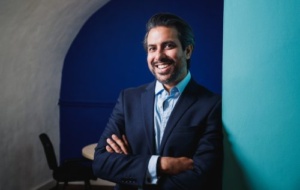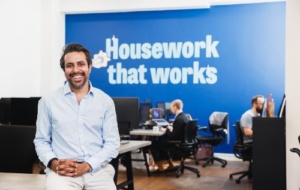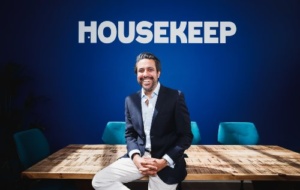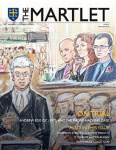Profile: Avin Rabheru

Avin Rabheru MBE (2001, PPE)
Avin Rabheru MBE (2001, PPE), is the Founder and CEO of Housekeep, the UK’s largest home services platform. He has spent most of his career in venture capital, and has invested in more than 50 early stage businesses as an angel investor and non-executive director.
In 2014, the cleaning industry was offline and inefficient. Housekeep has built technology to make the customer and cleaner experience seamless – from click to clean to cashless payment. They became the market leader in three years, delivered 1,500,000+ cleans and generated an average rating of 4.9*. They also raised the earnings of thousands of cleaners by 50%, and were ranked the 6th fastest-growing company in Europe by the Financial Times in 2019. They are now expanding to build the same seamless experience in every home service vertical in every city in the UK – from cleaning to gardening to plumbing.
Housekeep has won over 50 business awards, including:
• Scale-up Business of the Year at the Amazon Scale-Up Awards (2020)
• Tech Company of the Year (Medium) at the UK Business Tech Awards (2022)
• Property Tech Company of the Year at the Global Business Tech Awards (2022)
Avin Rabheru was awarded an MBE in the Queen’s New Year Honours in 2021 for services to entrepreneurship and digital innovation. He was named Tech Entrepreneur of the Year in 2022 and named Scale Up Entrepreneur of the Year 2019 at the British Entrepreneurs Awards.
Why did you apply to Univ and why did you choose PPE?
I’d always loved studying history, politics and economics, and had led or been closely involved in the relevant societies at school. PPE (Philosophy, Politics & Economics) was therefore a very natural fit, both in terms of the intellectual rigor required and the subjects themselves. Of course, like all good politics students in those days, I also wanted to make sure I was on track for the job of Prime Minister!
I distinctly remember arriving at the open day at Oxford with my father. I suspect like most prospective students I felt a little intimidated and unsure whether I’d fit in academically and socially. When I arrived at Univ, the students welcomed me with a smile and offered to show me around – it made a lasting impression on me and I’ve felt at home at Univ ever since.
What did you enjoy most about studying here?
I had a genuine interest in the subjects in their own right, and also enjoyed the intellectual problem-solving and challenge. There were also some terrific tutors, some of whom are still at Univ, such as Bill Child and Ngaire Woods. I also loved the social side – I took my role as President of the aptly-named Beveridge Society very seriously indeed.
What really stood out for me was the group of people that I was around. I made lifelong friends who are exceptionally talented and all doing incredible things today. One of those very good friends of mine joined Housekeep, a fellow PPEist from my year, Gareth Lloyd (2001, PPE). He joined as CTO and was our head of tech team for five years. We wouldn’t be where we are without him, without any doubt, and he remains a close friend. Recently, another PPEist, Oli Scully (2000, PPE), who was Beveridge Society President the year before me, joined Housekeep in our product team.
What is it about Univ and the Oxford college experience that makes it so special?
The college experience, especially at Univ, is a really special part of studying at Oxford. Univ was a big enough college to ensure you could find your own group of friends, but small enough for it to feel like a close-knit community. And then there’s these just exceptional people everywhere you look who in those days were somewhat raw talents and today are leaders in a wide variety of fields.
Are there particular memories that stand out?
I often reminisce about walking on High Street early in the morning or late at night when it would be empty apart from me. I’d find myself looking up in wonder at some of the buildings and asking myself how I got there. Or, at essay crisis time, at 4am when you walk from the library back across the Quad in the direction of Boster Hall, and because it’s so peaceful and quiet you catch yourself for a moment appreciating just how special that experience is in the moment itself.
Of course, there are the other weird and wonderful things that happened. Chatting to Chelsea Clinton whilst eating chips outside a kebab van, or Lord Butler and his various VIP guests coming through the Master’s Lodgings.
 What do you remember about tutorials?
What do you remember about tutorials?
Tutorials were great, although they were a challenging experience. I had never been taught in that way before, and no one really prepares you for the change in style and emphasis. I wish there had been some explanation of what they were and how to get the best out of them – or perhaps that in those days I had the confidence to ask, and I’d encourage our newer students to do just that. I really loved British politics and when I saw that Vernon Bogdanor was a tutor, I badgered the powers that to be to allow me to be taught by him; he was the equivalent of a celebrity to me.
Was there anything about your experience at Univ that took you in the direction of venture capital?
I’d always assumed that I would work in business. I grew up in a family where everybody worked in business or ran their own company. I don’t know if it was Univ specifically, but certainly, Oxford opened my eyes to investment banking, management consulting, venture capital and private equity. Most of the insight into what a career in business might really mean came from the careers days, with the big firms coming to do talks and presentations. I went to a lot of those to try and shape my thinking.
How did you think about businesses when a venture capital investor?
I used to invest in the growth capital space – specifically, businesses with up to a few million pounds of revenue but that hadn’t reached hundreds of millions of pounds in revenue yet. The first thing I would say is it’s all about the founders or the management team that you’re backing. By getting to where they’ve got to, they’ve already proven they’re in the top 1%, but they’re going to have to be in the top 0.01% to build a really standout business. You can assess whether these founders or management teams have the chops needed to get there by looking at their ability to make good decisions on repeat.
The second thing is around fundamental proposition and consequently the economics. Why do people want this? What are their alternatives? Is there an economic model that works here? If you take as an example the business I run, Housekeep, people say we don’t really have any competition. That’s great in theory but we do have competition in the sense that customers can choose not to hire a cleaner or a tradesperson, or they could ask a neighbour.
The third thing we really cared about is the size of the opportunity. What one generally finds is that really exceptional founders will find opportunity anywhere, whereas weak founders can’t. For example, take the Airbnb founders: the original market for people staying on sofas is small but if you reinvent hotels, the market is big.
When you are investing, do you find you are more attracted by the people or the idea?
It’s very hard to assess a team until you’ve got lots of experience yourself, and some sense of seeing things go well or go wrong. In the early days of my career, I relied more heavily than I now would have wished on how good the idea was, how big the market was and what the current traction was. In other words, the metrics that I could research or analyse. Today, I’m more interested in people, by assessing teams and their problem-solving abilities today and in the future.
There are broadly two types of founder. The first type are industry specialists, who are often quite spiky and challenging people. They’ve been in the industry a long time, they’re steeped in it, they know it inside out – but by definition, they think it isn’t working. They’re the people in the organisation who say: “this is wrong, I’m going to go and fix it because none of you lot are doing it right.” They’re hard people to assess because I don’t know anything about their business.
The second type are generic problem solvers – the PPEists if you like. The challenge with them is they’re the opposite. They’re eloquent and could tell you a story about anything and make it sound good. In the early days of your career, it’s very hard to critically assess such people.
What I would do now is look at what they’re actually delivering, whilst ignoring what I think about the proposition or what I think about the market. In other words, do customers like it, come back for me and are they willing to pay for it? If that’s true, it’s going in the right direction.
 What was the inspiration for Housekeep?
What was the inspiration for Housekeep?
I was the second type of founder: desperate to find a problem to solve. I sat down with a blank sheet of paper and listed the attributes that are common in businesses that I’d seen do well. Typically, there’s: a big market, a fragmented supply base and there’s scope to do it better, possibly through technology. I would describe this model as being applicable to what Pret did for sandwich stores, or what Uber did for taxis, or what Just East did for take-out.
I’d already invested in the consumer services and property services space, so started looking at home services. It’s a huge £40 billion market, very fragmented and there was no technology. I started looking at cleaning specifically, where there are really acute pain points on either side. Consumers can’t find a good quality cleaner, while cleaners can’t generate decent earnings. It also had the additional element of the potential for subscription and ongoing repeat purchases if you get it right.
I wanted to figure out how it really works so signed up a handful of friends as customers and did much of the early cleaning myself, which was physically exhausting (which in itself was a valuable learning experience). We’ve always had the ethos of doing the right thing and doing things right and that pervades through the company and in how we think about cleaners. As it happens, it makes very good economic sense to look after cleaners because ultimately a customer doesn’t care about how good the technology is, how slick our user flows are or how beautiful our copy is. They care about getting their home cleaned by a good quality cleaner who shows up every week, on repeat. As such, looking after a cleaner secures a whole group of customers. From that basic idea, we have just kept going.
Was it always an app or did it exist as something else initially?
We were completely offline initially. I really wanted to deeply understand the customer experience and the cleaner experience from first principles. I wanted to figure out the key growth barriers and understand if we could fix them. Indeed, so much so, I didn’t even waste time billing customers in the early months. Today, technology has acted as an accelerator – we’ve got some of the most advanced core technology algorithms in our industry today, with that expressed through web and apps to our users.
It’s exciting to see there are plans to branch out into other areas.
Absolutely. Housekeep started in 2014 with a relentless focus on just cleaning and just London. That went well and by 2019 we’d become market leader, had reached meaningful scale and were profitable.
Our vision now is to deliver every job in every home in the UK, whether you’re looking for a cleaner, plumber, electrician, builder, carpenter, gardener, painter and decorator or handyperson. We’re currently testing the model outside London, for example, in Brighton and St Albans. The growth rate in new services is extremely high. It’s early days, but these new verticals are already contributing 20% of the business. We’re able to reuse the learnings, experience and technology from our core business to move faster than our first attempt.
What was it like receiving the MBE?
It’s a proud moment personally, but also for my family, for my community back home in Manchester, for my peers at Univ, and really for the hundreds of people who have contributed to building Housekeep. I’m grateful to be able to share the moment with those around me.
What advice you would give to Univ students with entrepreneurial ambitions?
Don’t do it! There’s a real value to getting some other experience first. I’m a stronger founder because of the time I spent in strategy consulting and venture capital. For example, just this morning I spent some time working through a legal agreement which I’d otherwise not know where to start. I would say go and get some good, structured experience that will make you a stronger founder – if that’s what you really want to do – which also gives you some optionality. If it doesn’t work out, it means you’ve got a structured grounding for the rest of your career.
The second reason for saying don’t do it is it is hard and it takes a long time. It takes a lot of resilience – or grit – and, frankly, if you’re put off by me saying don’t do it then you probably don’t have what it takes.
Is there anything else you’d like to say about your time at Univ?
Univ, the environment and more importantly the people I was around there are really formative to who I am and some of the things that I’ve done. I’m immensely grateful to have had the opportunity to study there and to meet such brilliant people. And I have a very deep love for the College and can only say good things about my time there.
Find out more about Housekeep and Avin Rabheru via the links below:
Facebook
Twitter: Housekeep and Avin Rabheru
Instagram
YouTube
LinkedIn: Housekeep and Avin Rabheru
This feature was adapted from one first published in Issue 15 of The Martlet; read the full magazine here or explore our back catalogue of Martlets below:
Published: 30 January 2023
















